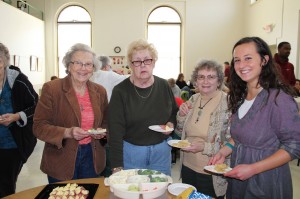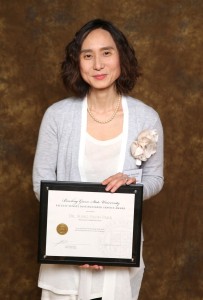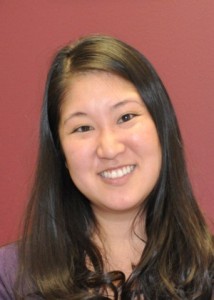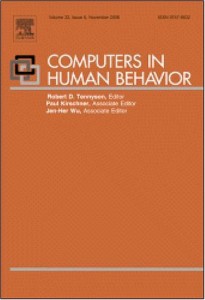Congratulations to undergraduate communication majors Casey Schonhardt, Brandon Stinson, Terry Taylor, and Ladonne Wilson will present their research at the Ohio Association of Gerontology and Education conference this April. Please continue reading for more information of their research projects, completed during independent studys/internship under the direction of Dr. MC.

Older Adults and technology: Adoption and acceptance comes from relationships and encouragement from younger generations
Paper to be presented by Casey Schonhardt
Abstract:
As technology progresses, older generations are being given ‘smart’ devices and are adopting these devices to keep up with daily life. Stereotypes posit that the different generational groups perspectives on each other and the digital divide prohibit older generations from adopting new technologies. At the Wood Country Center on Aging located in Bowling Green Ohio, the small group communication class of Bowling Green State University teaches tablet classes once a week to interested older adults. Classes were observed using the STAM (Senior Technology and Acceptance Model), specifically the acceptance phase, over six weeks with narrative and phenomenological research methods. Observing and assisting four small groups teaching older adults different categories of smart tablets, conclusions were made on why older adults accept the technology and even come back for further classes. At the end of the project, it was found that the more positive and genuinely encouraging the students were, the more the older adults consistently attended classes and engaged in learning. Despite rumors of barriers of an age and digital divide, social cues, the relationships made, and the environment play a part in the motivation of technological diffusion in older adult’s daily life.
Introducing and Teaching Information Communication Technology to Senior Citizens
Poster to be presented by Brandon Stinson
Abstract:
This poster examines older adults’ acceptance of information communication technologies (ICTs) as well as strategies for educating older adults about how to use ICTs. Information communication technology has become a key component in our society (Hernandez-Encuentra). For the majority of people it has become a pillar of their everyday lives (Trentin). Today however, many older adults are still reluctant to learn and integrate most information communication technology into their own lives (Gonzalez) as they have for years whenever new technology comes along. Research has shown that several different factors exist to explain why senior citizens do not welcome information communication technology (Loges). Even if they can be convinced to use this technology there are still several factors that can prevent them from both properly and efficiently using it. Researchers have shown that there are numerous methods to teach senior citizens how to properly use information communication technology with varying degrees of success (Jones). This poster will summarize what I have discovered through both compiling information as well as my personal observation with teaching seniors through Dr. Magsamen-Conrad’s Small Group Communication class and an internship at the Wood County Committee on Aging. During Dr. Magsamen-Conrad’s class in the Spring 2014 semester, small groups of five students spent six weeks in a classroom setting teaching older adults how to use tablets. This was the same idea at the internship. From July to August 2014 I taught roughly fifteen older adults how to use tablets in a mostly one on one setting. As older adults continue to become an increasingly larger portion of our population (Lam) it is becoming morevital than ever that they learn and accept information communication technology and become integrated with the rest of society (Feist).
RED: Retired, Engaged, and Determined
Poster to be presented by Terry Taylor
Abstract:
My name is Terry Taylor. I am a senior at Bowling Green State University majoring in Communications with a minor in Geography. Iplan to submit a full paper to be considered for a student award and my professor’s name is Dr. Kate Magsamen-Conrad. I worked very close with Dr.MC through a communications class at the senior center that focused on small group communication. I look into the service that we provided through a series tablet classes held at Bowling Green’s senior center and explore the idea and possibility of expanding the market or services to this age demographic. With the age of retires about to reach and all time high due to the Baby Boomers and the fact that technology is changing and advancing every year, I feel that it is vital to provide similar services as we did in our tablet classes held through the senior center on a wider scale. I conclude with reasoning on why this increased knowledge and interaction through technology is imperative for older adults. My objective is to show a need for the increase in understanding of technology for older adults on a broad scale and to make it aware that this is very beneficial to them in physical, mental, social, and various other forms.
Older Adults Attitudes towards New Communication Technologies
Poster to be presented by Ladonne Wilson
Abstract: As the amount of New Communication Technologies (NCTs) being created increases at an exponential rate it is important to better understand how all portions of our population take advantage of newer NCTs, including older adults. This study sought to better understand older adult’s attitudes towards NCTs as a means of learning and adaption as well as maintaining independence. The researchers argued that older adult’s attitudes toward NCTs have an effect on older adult’s perceived and therefore actual usability. This study was conducted by a communication research methods course at an Ohio public university and it included surveys and interviews of 525 older adults living in the Midwestern United States. The researchers divided the participants into four age groups, Builders, Boomers, Generation Xers and Millennials, and focused primarily on web literacy, performance expectancy, and effort expectancy. The researchers found that there were significant generational differences in attitudes towards NCTs and younger generations were more likely to positively respond to newer NCTs than older generations. The researchers also found that older adults do not experience an immediate attraction to NCT’s unlike younger generations. The researchers posit that these results indicate that must be a greater focus on reducing the deficit between younger and older generations and their respective levels of NCT literacy.






